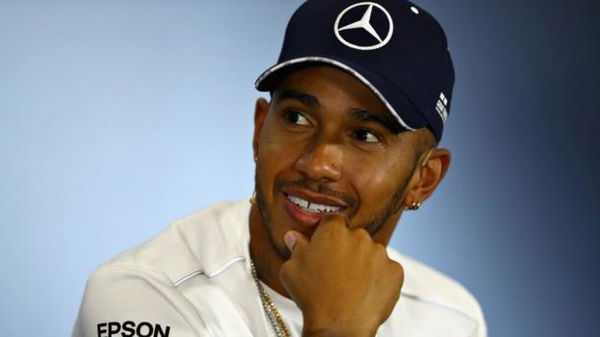
via Imago
Lewis Hamilton dropped a retirement hint

via Imago
Lewis Hamilton dropped a retirement hint
Speaking on the eve of the Japanese Grand Prix the Mercedes principal, Toto Wolff, is in a remarkable position. He and Lewis Hamilton are within touching distance of stewarding his team to equalling the greatest run of success in Formula One history. The Austrian smiles when the subject is brought up but this relaxed demeanour is offset by the steely gaze that has helped make Mercedes the pre-eminent force in F1.
Should Mercedes and Lewis Hamilton complete another drivers’ and constructors’ championship double this year the team will match Ferrari’s record of five in a row, all secured with Michael Schumacher between 2000 and 2004. An achievement it was hard to imagine would ever be matched, let alone bettered, is a goal now within Mercedes’ compass.
Going into Sunday morning’s Japanese Grand Prix, Hamilton led Sebastian Vettel in the drivers’ championship by 50 points and Mercedes led Ferrari in the constructors’ by 53, with five races remaining. They have one hand on both titles but before the race Wolff is unwilling to take anything for granted regardless of how events at Suzuka unfold. It is an intensity that he has instilled in the team and undoubtedly a contributory factor in their extraordinary success. Something exemplified by their superb, calm execution of qualifying at Suzuka that ensured Hamilton’s pole.
ADVERTISEMENT
Article continues below this ad
“This is a tough fight and nobody is prepared to give an inch, not us, not our competitors,” he says. “It’s five races to go, lots of points to score and that is why you cannot take your foot off the pedal. We must be relentless and resilient.”

via Imago
Toto Wolff
He will think about Ferrari’s record in December if and when the job is done; the present is all. “I always fear losing the world championship, even now,” he says. “Because this is motor racing and things can change pretty quickly. Every time when we become a little too optimistic I remind myself of the championship Lewis lost by one point in 2007. He was in the lead by what would be today 45 points with two races to go. So the thought of the possibility of losing is omnipresent.”
It is understandable that he should choose an example featuring Hamilton, albeit one from when the Briton was driving for McLaren. The pair joined Mercedes in 2013 and have grown closer through experience and unprecedented success for the team. Hamilton’s move, questioned at the time, proved inspired. Since the turbo-hybrid era began in 2014, Mercedes have won 71 races.
Lewis Hamilton has been at the heart of this success story. He has won three of their four titles, losing out only to his teammate at the time, Nico Rosberg, in 2016. This season, the toughest they have faced since 2014, he has made the difference as the team saw off a mid-season challenge from Ferrari, who have enjoyed the quicker car since the British Grand Prix.
Hamilton’s wins against expectations at Monza and Singapore were decisive and while Wolff is never short of praise for him he also stressed that Hamilton is the most public piece in a large and complex organisation of more than 900 people. They must all be functioning at the same high level as the man behind the wheel and Wolff’s pride in them is clear.

via Imago
Lewis Hamilton with team boss Toto Wolff at a press conference
“What I saw in Singapore was one of the best performances ever, the whole weekend,” he says. “Also in Monza he was outstanding. He had a fabulous first lap and a great drive. But as a team we have provided the drivers with a very strong package. We have not cracked under the pressure of not being the fastest package over the summer but we have upped the pace and he has upped the pace.”
As well as the threat from Ferrari the team has endured some poor strategy calls that cost Hamilton the win in Australia, a potential win in Austria and his position was compromised in Russia. But they have also been strong on the pit wall as demonstrated in Hockenheim, Hungary and Monza. Alongside bringing his skill to the track Lewis Hamilton has developed mentally to cope with these swings in fortune.
“In the past it took him longer to dig himself out of a hole,” says Wolff. “The more experience he has, the more his personality has developed. The great thing is his ability to leave negativity behind, an important skill for a driver; for any person.”
ADVERTISEMENT
Article continues below this ad
That appraisal stands in contrast to his evaluation of Vettel. Last season, he deliberately barged Hamilton’s car in Baku and this year he has made a series of costly errors. While the Briton wears his heart on his sleeve in public, his cool judgment behind the wheel has been crucial. “Sebastian has a great ability in that his emotion makes him a great driver and won him four championships,” says Wolff. “He wouldn’t be who he is and wouldn’t have scored the victories he did without the emotion but that emotion has also cost him.”

via Imago
Lewis Hamilton
Part of Wolff’s responsibilities in taking Mercedes to these rarefied heights has been in ensuring his drivers are in the best possible situation to exploit the hugely impressive car that has emerged from Brackley over the past five seasons. “Lewis is such a complex individual, multi-faceted like all the high performers I have met,” he says. “Most of them are sensitive, need the right environment, the right setup, to function on the highest level.”
ADVERTISEMENT
Article continues below this ad
Wolff has ensured this at Mercedes by stressing the trust built between the driver and his team. It is a process that has taken time and transparency such that “even in the awkward moments we are discussing things and putting the finger in the wound”.
The rewards from this approach are clear. Lewis Hamilton is driving better than ever and Mercedes are close to making history. Yet any doubts they do not believe it is yet over were dismissed when they controversially ensured Hamilton’s victory at the last round in Russia. As Wolff has made patently clear, there will be no let-up from this finely honed machine until both titles are secured.
ADVERTISEMENT
ADVERTISEMENT
ADVERTISEMENT
ADVERTISEMENT

